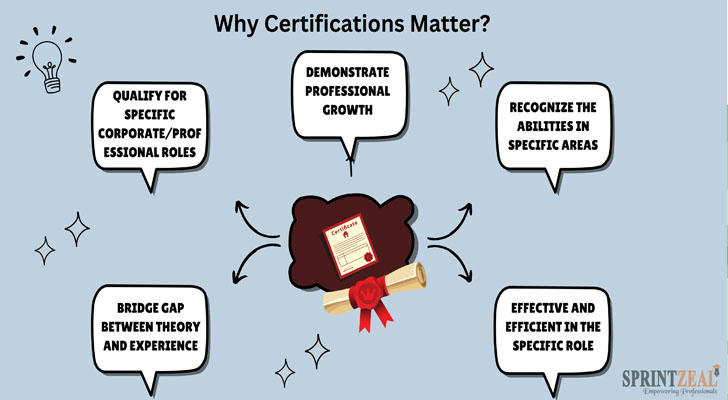How to Prep for Industry-Specific Certifications: A Fun and Strategic Guide
So, you’ve decided to go after that shiny industry-specific certification. Maybe it’s a PMP for project management, a CPA for accounting, or even a sommelier certification because, well, wine is life. 🍷 Whatever your goal, one thing’s for sure: Preparing for a certification exam can feel like training for a marathon while juggling flaming torches. But don’t worry—we’ve got your back. Let’s break down how to prep for your certification like a pro, with a dash of fun and a sprinkle of strategy.

Why Industry-Specific Certifications Matter
Before we dive into the “how,” let’s talk about the “why.” Industry-specific certifications are like golden tickets to career growth. They validate your expertise, boost your credibility, and often open doors to higher-paying roles. Plus, they’re a great way to show employers (and yourself) that you’re serious about your craft.
But here’s the thing: Not all certifications are created equal. Some are straightforward, while others feel like climbing Mount Everest in flip-flops. That’s why preparation is key.
Step 1: Know Your Enemy (aka the Exam)
Every certification exam has its own quirks, so your first step is to understand what you’re up against. Here’s how:
Research the Exam Format
Is it multiple-choice? Essay-based? A mix of both? Knowing the format will help you tailor your study strategy.Understand the Content Domains
Most certifications cover specific topics or “domains.” For example, the PMP exam focuses on areas like project planning, execution, and risk management. Break down the content into manageable chunks and tackle them one at a time.Check the Passing Score
Some exams require a 70% to pass, while others use a scaled scoring system. Knowing the benchmark will help you set realistic goals.

Step 2: Gather Your Tools (Study Resources)
Think of your study materials as your certification toolkit. Here’s what you’ll need:
Official Study Guides
These are the holy grail of certification prep. They’re written by the certifying body and cover everything you need to know.Online Courses and Webinars
Platforms like Coursera, Udemy, and LinkedIn Learning offer courses tailored to specific certifications. Bonus: Many include practice exams.Flashcards and Apps
Flashcards are a great way to memorize key concepts, and apps like Quizlet let you study on the go.Study Groups and Forums
Joining a study group or online forum can provide support, motivation, and valuable insights from others who’ve been there.

Step 3: Create a Study Plan (and Stick to It)
A study plan is your roadmap to success. Here’s how to create one:
Set a Timeline
Work backward from your exam date. If the test is in three months, break your study schedule into weekly goals.Mix It Up
Don’t just read—mix in videos, practice questions, and hands-on activities. Variety keeps things interesting and helps reinforce learning.Schedule Breaks
Studying for hours on end is a recipe for burnout. Use techniques like the Pomodoro Method (25 minutes of study, 5 minutes of break) to stay fresh.Track Your Progress
Keep a checklist of topics you’ve mastered and areas that need more work. Celebrate small wins to stay motivated.
Step 4: Practice, Practice, Practice
Practice exams are your best friend. They help you get comfortable with the format, identify weak spots, and build confidence. Here’s how to make the most of them:
Simulate Exam Conditions
Take practice tests in a quiet environment, timed just like the real exam.Review Your Answers
Don’t just check if you got it right—understand why. This helps you learn from mistakes and avoid repeating them.Focus on Weak Areas
Use your practice test results to pinpoint topics that need more attention.

A Case Study: The “Certified Scrum Master” Journey
Meet Jamie, a software developer who wanted to transition into a Scrum Master role. She decided to pursue the Certified ScrumMaster (CSM) certification, but she wasn’t sure where to start.
Jamie began by researching the exam format and content. She learned that the CSM exam focuses on Scrum principles, roles, and practices. She then gathered her tools: an official Scrum guide, an online course, and a set of flashcards.
Next, Jamie created a study plan. She set aside two hours every evening for studying and used weekends for practice exams. She also joined a local Scrum study group, where she could ask questions and share tips.
When exam day arrived, Jamie felt prepared but nervous. She aced the test on her first try, thanks to her thorough preparation. Today, she’s a successful Scrum Master, helping teams deliver projects efficiently and effectively.
Step 5: Take Care of Yourself
Preparing for a certification exam can be stressful, but don’t forget to take care of yourself. Here’s how:
Get Enough Sleep
Your brain needs rest to absorb information. Aim for 7-8 hours of sleep per night.Eat Brain-Boosting Foods
Fuel your study sessions with healthy snacks like nuts, berries, and dark chocolate.Exercise Regularly
Physical activity reduces stress and improves focus. Even a short walk can make a big difference.Stay Positive
Believe in yourself! You’ve put in the work, and you’re ready to crush this exam.
Final Thoughts: You’ve Got This!
Preparing for an industry-specific certification is a journey, but it’s one worth taking. With the right tools, a solid plan, and a positive mindset, you can conquer that exam and take your career to new heights.
So, grab your study materials, put on your favorite playlist, and get to work. Your future certified self will thank you. 🎉
What certification are you working toward? Share your goals, tips, or funny study stories in the comments below! Let’s cheer each other on. 😊
